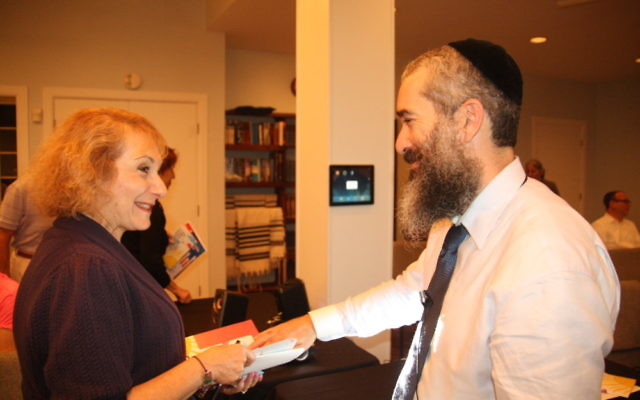Positive Message Starts With Gratitude
Above: A teacher from Torah Day School, Rosita Lew, shows gratitude to Rabbi Eliyahu Schusterman after his presentation on the value of being grateful.
I once thought that Modeh Ani, the 12-word prayer recited upon waking up, was just for children. When I became observant, I found out differently. Since then, I recite Modeh Ani as soon as I open my eyes in the morning, but I’m not always focused on what I’m saying.
After attending Chabad Intown’s gratitude seminar, “Waking Up to Life,” on Thursday, June 23, I’m concentrating more on Modeh Ani, thanking G-d for giving me another precious day of life.
Streaming live on Facebook, Rabbi Eliyahu Schusterman, the director of Chabad Intown, addressed an in-person crowd of about 30 people, who discussed being thankful, watched video clips and filled in a booklet of learning exercises.
The message of the first exercise, “How to Be Happy,” permeated the seminar. The basic premise was to choose between green and red pills that could solve our problems. The green pill could provide whatever people desired. With the red pill, people would never get anything else for the rest of their lives but would be happy with whatever they had.
“It’s essentially a choice between being happy with little or being happy with everything,” the text read. “Which would you choose and why?”
Rabbi Schusterman played a video clip about the rising rates of depression all over the world. Bar graphs showed that as levels of material prosperity have risen, so has depression.
“If we’re so rich, why aren’t we happy?” the Chabad rabbi asked.
“Material things are finite,” he said, “and the eternal drive isn’t satisfied with the finite.”
Often, it’s the journey to achieve something that’s exciting; once that thing is achieved, a new bar is raised. “We’re never going to find happiness in the attainment of goals,” Rabbi Schusterman said. “Nobody in life says, ‘I’ve got enough.’ ”
How to achieve and sustain happiness from within is the challenge. We’re often distracted from that internal focus, the rabbi said. Plus, it’s human nature to dwell on the negative. If we do nine positive things and one negative in a day, we stay up at night thinking about the negative.
“The world has tapped into this negativity,” Rabbi Schusterman said. TV news, newspapers and news websites often follow the saying “If it bleeds, it leads.” Happiness researcher and GoodThink founder Shawn Achor has said our negativity bias has some benefits, such as helping us avoid danger, but being absorbed in negativity makes it hard to maintain a positive attitude.
Still, the world is not all doom and gloom, the rabbi said. He said Brian Tracy in the book “Getting Rich Your Own Way” writes that we can rewire our minds by reading something passionate and investing in ourselves before we go negative.
Rabbi Schusterman offered four Torah suggestions on how to invest in a positive outlook:
- List your blessings.
- Dwell on one or two.
- Thank your benefactors.
- Thank G-d.
“The brain has unbelievable power to rewire itself,” said Rabbi Schusterman, who suggested that the best times to make the effort are before we fall asleep at night and when we wake up. Meditating on two or three of the day’s successes at night can help us wake with positive feelings.
The rabbi called the moment when we awake an “alpha wave moment,” a good time to be thankful.
That’s where Modeh Ani comes in. Recited in Hebrew or English, the prayer thanks G-d for His great compassion in believing in us.
“Articulating kindness done for us, whether to G-d or others, makes it real,” Rabbi Schusterman said. If we want to develop a positive attitude, we can start by being grateful to G-d: “Look who’s giving me these blessings. There’s someone who values me, who finds me important.”
For me, the most meaningful experience of the seminar came near the end when we watched a video of a robust 13-year-old giving his bar mitzvah speech. The boy implored everyone to recite Modeh Ani in the morning and be thankful to G-d for another day of life.
To look at and listen to him, you wouldn’t know the daily struggles the boy had endured from birth. Every four hours, around the clock, he had to be injected with something his body needed to stay alive. The video showed him in the hospital, at a skating rink, at simcha celebrations with his family, and he was always smiling.
Rabbi Schusterman said the boy died shortly after celebrating his bar mitzvah.
The “Waking Up to Life” booklet is “dedicated in loving memory of Menachem Mendel Cotlar … a master of gratitude … who inspired hundreds to count and cherish the blessings in their own lives.” I’m one of them.
Photos by R.M. Grossblatt






comments